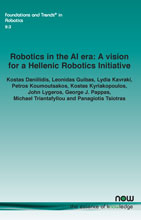Robotics in the AI era: A vision for a Hellenic Robotics Initiative
By Kostas Daniilidis, University of Pennsylvania, USA | Leonidas Guibas, Stanford University, USA | Lydia Kavraki, Rice University, USA | Petros Koumoutsakos, Harvard University, USA | Kostas Kyriakopoulos, NTU Athens, Greece | John Lygeros, ETH Zurich, Switzerland | George J. Pappas, University of Pennsylvania, USA, pappasg@seas.upenn.edu | Michael Triantafyllou, Massachusetts Institute of Technology, USA | Panagiotis Tsiotras, Georgia Institute of Technology, USA
Abstract
In January 2021, the Hellenic Institute of Advanced Study (HIAS) assembled a panel including world leading roboticists from the Hellenic diaspora, who volunteered their scientific expertise to provide a vision for Robotics in Greece. This monograph, entitled “Robotics in the Artificial Intelligence (AI) era,” will hopefully trigger a dialogue towards the development of a national robotics strategy. Our vision is that Robotics in the AI era will be an essential technology of the future for the safety and security of the Hellenic nation, its environment and its citizens, for modernizing its economy towards Industry 4.0, and for inspiring and educating the next generation workforce for the challenges of the 21st century. To contribute towards making this vision a reality, after reviewing global trends in robotics and assessing the Greek robotics ecosystem, we arrived at the following key findings and recommendations: Firstly, we think that Greece should develop a national Hellenic Robotics Initiative that serves as the nation’s long-term vision and strategy across the entire Greek robotics ecosystem. Also, certain societal drivers should be key in the areas of focus. Safety and security is an area of national importance necessitating a national initiative, while agrifood, maritime and logistics provide opportunities for internationally leading innovation.
We recommend the establishment of a mission-driven, government-funded, organization advancing unmanned vehicles in societal drivers of national importance, and Greece should leverage its unique geography and become a living testbed of robotics innovation turning the country into a development site for exportable technologies. In our opinion, universities should create Centers of Excellence in robotics and AI as well as consider innovation-leading research institutes such as the Italian Institute of Technology. We recommend investing in robotics education using Maker Spaces in order to prepare the workforce with 21st century skills to become Industry 4.0 innovators. Furthermore, we believe that the government should collect, measure, and analyze data on the robotics industry, robotics uses, labor shifts, and brain gain and promote awareness via a Hellenic Robotics Day. And finally, the government should regulate robot safety without stifling innovation, provide safe experimentation areas and mechanisms for certifying safety of locally developed robots. This monograph has many additional suggestions that enhance the above main recommendations. As authors, we advocate bringing the robotics ecosystem together in order to sharpen and expand these findings to an ambitious, long-term, and detailed national strategy and roadmap for robotics in the AI era.
Robotics in the AI era: A vision for a Hellenic Robotics Initiative
This monograph, entitled Robotics in the Artificial Intelligence (AI) era, presents the findings and recommendations of a study conducted by the Hellenic Institute of Advanced Study (HIAS).
Robotics in the era of artificial intelligence will transform every aspect of society, security, and economy. Agricultural robots can assist farmers in reducing exposure to dangerous spraying pesticides, while selective harvesting for increasing yield and quality operations. Robots with advanced perception can be used for automatic inventory inspection and management. Underwater vehicles can be used for inspecting ship hulls and pipelines or ports, while aerial robots can ensure the delivery of urgent medical supplies in remote islands in the sea or mountainous rural regions. This is not science fiction, the technological revolution described above is starting to happen around the world.
By presenting various applications and possibilities, this monograph should appeal to persons involved specifically with robotics, and technology development in general.
